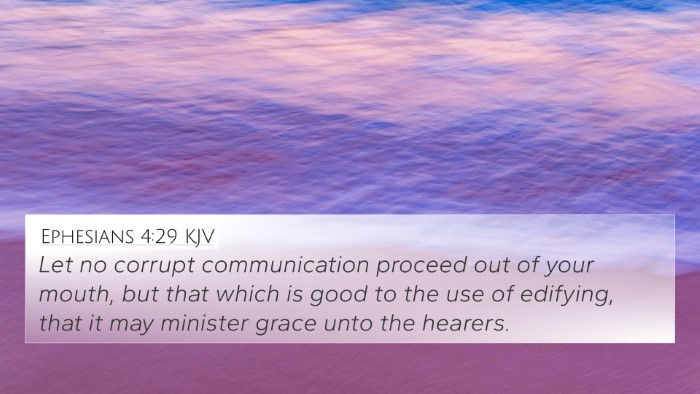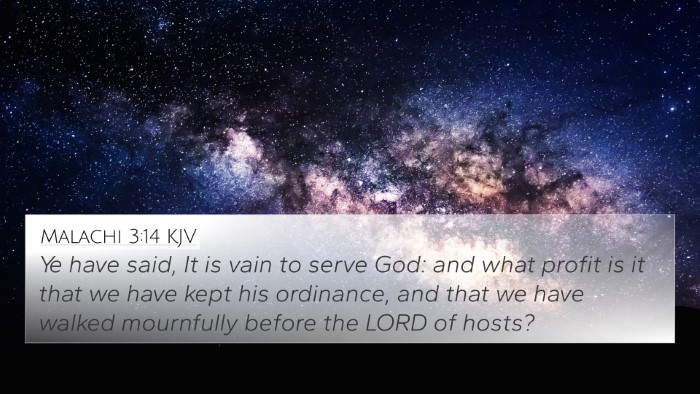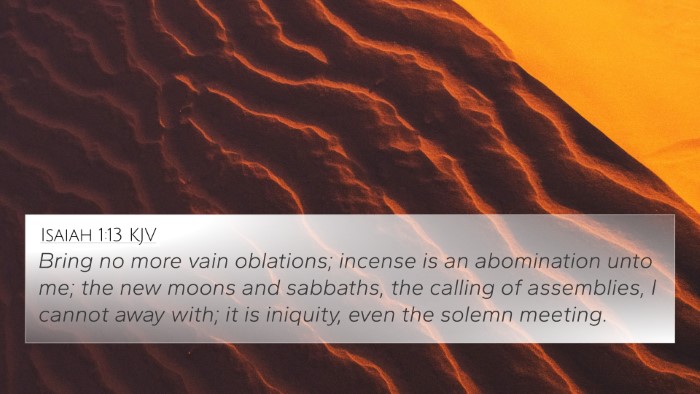Old Testament
Genesis Exodus Leviticus Numbers Deuteronomy Joshua Judges Ruth 1 Samuel 2 Samuel 1 Kings 2 Kings 1 Chronicles 2 Chronicles Ezra Nehemiah Esther Job Psalms Proverbs Ecclesiastes Song of Solomon Isaiah Jeremiah Lamentations Ezekiel Daniel Hosea Joel Amos Obadiah Jonah Micah Nahum Habakkuk Zephaniah Haggai Zechariah MalachiJames 1:26 Similar Verses
James 1:26 Cross References
If any man among you seem to be religious, and bridleth not his tongue, but deceiveth his own heart, this man's religion is vain.
Uncover the Rich Themes and Topics of This Bible Verse
Listed below are the Bible themes associated with James 1:26. We invite you to explore each theme to gain deeper insights into the Scriptures.
James 1:26 Cross Reference Verses
This section features a detailed cross-reference designed to enrich your understanding of the Scriptures. Below, you will find carefully selected verses that echo the themes and teachings related to James 1:26 KJV. Click on any image to explore detailed analyses of related Bible verses and uncover deeper theological insights.

Ephesians 4:29 (KJV) »
Let no corrupt communication proceed out of your mouth, but that which is good to the use of edifying, that it may minister grace unto the hearers.

1 Peter 3:10 (KJV) »
For he that will love life, and see good days, let him refrain his tongue from evil, and his lips that they speak no guile:

Ephesians 5:4 (KJV) »
Neither filthiness, nor foolish talking, nor jesting, which are not convenient: but rather giving of thanks.

Proverbs 10:31 (KJV) »
The mouth of the just bringeth forth wisdom: but the froward tongue shall be cut out.

Proverbs 19:1 (KJV) »
Better is the poor that walketh in his integrity, than he that is perverse in his lips, and is a fool.

Colossians 4:6 (KJV) »
Let your speech be alway with grace, seasoned with salt, that ye may know how ye ought to answer every man.

James 1:19 (KJV) »
Wherefore, my beloved brethren, let every man be swift to hear, slow to speak, slow to wrath:

James 3:2 (KJV) »
For in many things we offend all. If any man offend not in word, the same is a perfect man, and able also to bridle the whole body.

Proverbs 10:19 (KJV) »
In the multitude of words there wanteth not sin: but he that refraineth his lips is wise.

Psalms 39:1 (KJV) »
I said, I will take heed to my ways, that I sin not with my tongue: I will keep my mouth with a bridle, while the wicked is before me.

Proverbs 16:25 (KJV) »
There is a way that seemeth right unto a man, but the end thereof are the ways of death.

Luke 8:18 (KJV) »
Take heed therefore how ye hear: for whosoever hath, to him shall be given; and whosoever hath not, from him shall be taken even that which he seemeth to have.

Galatians 6:3 (KJV) »
For if a man think himself to be something, when he is nothing, he deceiveth himself.

Deuteronomy 11:16 (KJV) »
Take heed to yourselves, that your heart be not deceived, and ye turn aside, and serve other gods, and worship them;

Malachi 3:14 (KJV) »
Ye have said, It is vain to serve God: and what profit is it that we have kept his ordinance, and that we have walked mournfully before the LORD of hosts?

Proverbs 21:26 (KJV) »
He coveteth greedily all the day long: but the righteous giveth and spareth not.

Proverbs 13:2 (KJV) »
A man shall eat good by the fruit of his mouth: but the soul of the transgressors shall eat violence.

Isaiah 1:13 (KJV) »
Bring no more vain oblations; incense is an abomination unto me; the new moons and sabbaths, the calling of assemblies, I cannot away with; it is iniquity, even the solemn meeting.

Galatians 2:6 (KJV) »
But of these who seemed to be somewhat, (whatsoever they were, it maketh no matter to me: God accepteth no man's person:) for they who seemed to be somewhat in conference added nothing to me:

Matthew 15:9 (KJV) »
But in vain they do worship me, teaching for doctrines the commandments of men.

Mark 7:7 (KJV) »
Howbeit in vain do they worship me, teaching for doctrines the commandments of men.
James 1:26 Verse Analysis and Similar Verses
Understanding James 1:26
James 1:26 states, "If anyone thinks he is religious and does not bridle his tongue but deceives his heart, this person's religion is worthless." This verse serves as a poignant reminder of the importance of self-control and the impact of our words on our faith. It cautions against superficial religiosity lacking genuine inward transformation.
Summary of Insights from Public Domain Commentaries
In exploring the depths of James 1:26, we draw from the rich exegesis of various biblical scholars:
-
Matthew Henry:
Henry emphasizes that true religion is not merely outward practice or ritualistic behavior; it must be accompanied by a disciplined tongue. He notes that many may profess faith, but their actions—especially what they say—reveal the authenticity of their heart. The ability to control one’s speech is a key marker of true piety, pointing to the necessity of aligning one's speech with godly wisdom.
-
Albert Barnes:
Barnes articulates that this verse serves as a test for one's religious profession. He asserts that religion is not just a matter of external ceremonies but involves the whole character, which includes what is spoken. A lack of control over one’s speech is indicative of deeper spiritual issues and can render one's religious practices ineffective and insincere.
-
Adam Clarke:
Clarke points out that the phrase "bridle his tongue" suggests the necessity of controlling not only what is spoken but also the manner in which it is delivered. He argues that unchecked speech often leads to deception within one’s own heart, thereby undermining the foundations of a faithful life. Clarke highlights that the essence of religion includes the management of one’s words, asserting the practical aspect of faith in everyday interactions.
Key Themes and Biblical Cross References
James 1:26 speaks to the theme of integrity in one's faith and the crucial link between what we profess and how we conduct ourselves, especially through our speech. Below are several biblical cross-references relating to this verse:
- Proverbs 13:3: "Whoever guards his mouth preserves his life; he who opens wide his lips comes to ruin."
- Proverbs 21:23: "Whoever keeps his mouth and his tongue keeps himself out of trouble."
- Matthew 12:34-37: "For out of the abundance of the heart the mouth speaks..." This connects the heart's condition with speech.
- Ephesians 4:29: "Let no corrupting talk come out of your mouths, but only such as is good for building up..." emphasizing the purposeful use of speech.
- 1 Peter 3:10: "For whoever desires to love life and see good days, let him keep his tongue from evil..." aligns with the importance of controlling speech.
- Proverbs 18:21: "Death and life are in the power of the tongue..." illustrating the profound impact of our words.
- Colossians 4:6: "Let your speech always be gracious, seasoned with salt..." a call to thoughtful communication.
- James 3:2: "For we all stumble in many ways. And if anyone does not stumble in what he says, he is a perfect man..." further reinforcing the significance of controlling one's speech.
- Luke 6:45: "The good person out of the good treasure of his heart produces good..." reinforcing the connection between heart and speech.
- Matthew 5:37: "Let what you say be simply 'Yes' or 'No'..." teaching the importance of straightforward and sincere communication.
Thematic Connections
This verse can be linked to numerous other scriptures that discuss the heart, speech, and the practice of genuine faith. By examining these connections, we can better understand the call for authenticity in our religious practice. Engaging with tools for Bible cross-referencing can help unveil these interconnections between texts and themes.
Using Tools for Bible Cross-Referencing
By employing Bible reference resources such as concordances or cross-reference guides, believers can examine how different passages illuminate one another, offering a richer understanding of scriptural teachings. These tools enhance our study, allowing for a comparative Bible verse analysis that draws on the full context and wisdom of Scripture regarding issues of the heart and tongue.
Conclusion
James 1:26 serves as a crucial reminder that true religion manifests in our hearts, reflected through our speech and actions. As we seek to understand this verse and its implications, the connections with other biblical texts fortify our study. By embracing a practice of cross-referencing biblical texts, we become more adept at uncovering the profound truths that the Scripture holds, ultimately guiding us toward authentic living in accordance with God’s purpose.





